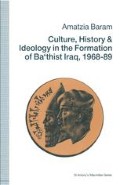Abstract
In the political, social and economic spheres the infant regime embarked on a policy of ‘stick and carrot’ or, as it came to be known among the populace of Iraq, al-tarhib wal-targhib (‘intimidation and attraction’). Ba‘th coercion on both the Shi‘a and the Kurds was unprecedented in the history of modern Iraq; and for the Shi‘a, after the rise in oil revenues following the Arab-Israeli war in 1973, the inducements of the carrot policy were likewise unprecedented.
Access this chapter
Tax calculation will be finalised at checkout
Purchases are for personal use only
Preview
Unable to display preview. Download preview PDF.
Notes
For example, al-Hayat, 22, 26, 27, 28 June; 1, 11, 12 July; 2, 4, 20 August 1969; al-Nahar, 5 July, 31 August, 26 September 1969; Nida al-Watan, 26 June, 21 July 1969; al-Jarida, 15 June, 16, 28, 30 August, 18 September 1969; al-‘Amal (Beirut), 8 August 1969; al-Thawra, (hence: Th); al-Jumhuriyya (hence: Jum), 8 May, 12–13 August, 29 September 1969; 8–25 February, 24 March 1977; Edith and E. F. Penrose, Iraq, International Relations and National Development (London and Boulder, 1978), pp. 373–4; Saddam husayn warith al-shah (Munazzamat al-‘Amal al-Islami, Tehran, 1981); Tariq al-Thawra (Tehran) no. 25, Rajab, 1402; al-Dawa Chronicle (London), no. 4, August 1980; no. 10, February 1981; no. 22, February 1982; no. 30, October 1982; no. 37, May 1983; no. 38, June 1983; no. 39, July 1983; no. 40, August 1983; Imam (The Iranian Embassy in London), April–May 1982; al-Jihad (Tehran), 6 September 1982; Impact International, 25 April–8 May 1980. Alif Ba, 16 April 1980, p. 15. ‘A. Najaf, al-Shahed al-shahid (Tehran, Jama‘at al-‘ulama al-mujahidin, 1981), pp. 12, 27, 45; Amnesty International News Release (London), 10 March, 12 June, 1980; Amnesty International, Report and Recommendations … to the Government of the Republic of Iraq, 22–28 January 1983, pp. 21,39; Sawt al-Iraq, September 1983; al-Nahar (Beirut, 25 June 1983); Iraq’s FM Tariq ‘Aziz confirming executions, Reuter, from Kuwait, 20 July 1983; al-Shira‘ (Beirut), 1 August 1986. There are no reliable figures as to the total number of Shi‘i deportees. According to Iranian sources, it rose in 1989 to close to five hundred thousands (including forty thousand Kurds). See Tehran Times, 28 February 1989, p. 1.
For example, Marr, pp. 240–3, 261–4, 268–70, 272; Edith and E. F. Penrose, Iraq, International Relations and National Development (London and Boulder, 1978), pp. 452–60; Marion Farouk-Sluglett and Peter Sluglett, pp. 137–40;
Amazia Baram, Iraq of the Ba‘th 1968–1989: An Anatomy of Political Change (forthcoming, due in 1991).
Saddam Husayn, al-Thawra wal-nazra al-jadida (Baghdad, 1981), pp. 79–80. See also, ibid., pp. 101–4. And see in the resolutions of the Eighth Regional Iraqi Party Congress of January 1974, Thawrat 17 tammuz al-tajriba wal-afaq (Baghdad, 1974), pp. 162–4; and Saddam Husayn to the Popular Front, Jum, 26 April 1974; President Bakr on Revolution Day, Jum, 18 July 1974.
And Saddam Husayn, ‘Hawla iqamat al-ishtirakiyya fi qutr ‘arabi wahid’ (On the Establishment of Socialism in One Arab Country), Afaq ‘Arabiyya, June 1978, pp. 2–9.
For details, see Marr, pp. 220–5, 244–6, 291ff; Farouk-Sluglett and Sluglett, pp. 132–4, 178–81, 187–90, 200–5; Majid Khadduri, Socialist Iraq (Washington, D.C., 1978), pp. 148–64, 166–7, 173–4;
Naomi Sakr, ‘Economic Relations Between Iraq and Other Arab Gulf States’, in Tim Niblock (ed.), Iraq, the Contemporary State (London, 1982), pp. 150–67; my articles, ‘Qawmiyya and Wataniyya in Ba‘thi Iraq, A Search of a New Balance’, MES, vol. 19, no. 2, April, 1983, pp. 188–200; ‘The June 1980 elections to The National Assembly in Iraq’, Orient, vol. 22, no. 3, September 1981, pp. 391–412; ‘Ideology and Power Politics’, in Ma‘oz and Yaniv, ibid.; ‘Saddam Husayn: A Political Profile’, The Jerusalem Quarterly, no. 17, Fall 1980, pp. 115–44.
For an attempt to re-evaluate the political, economic and social policies of the Ba‘th regime in an historical perspective, see A. Baram, Iraq of the Ba‘th, 1968–1989: An Anatomy of Political Change (forthcoming, due in 1991).
For Sa‘ada’s position see, for example, Dustur al-hizb al-suri al-qawmi al-ijtima‘i (n.p. 1958) pp. 7–8; and for the views of the proponents of Egyptian Nationalism, see Israel Gershuni and James P. Jankowski, Egypt, Islam, and the Arabs, the Search for Egyptian Nationhood 1900–1930 (Oxford and New York, Oxford University Press, 1986), pp. 40–54, 77ff. For Sati‘ al-Husri’s views see for example his al-‘Uruba awwalan (Beirut, 1958), pp. 113–15, 125–6; Difa‘ ‘an al-‘uruba (Beirut, 1957) pp. 52, 63, 70–9; Ma hiya al-qawmiyya (Beirut, 1959) pp. 251–2; Hawla al-qawmiyya al-‘arabiyya (Beirut, 1961) pp. 94–103, 105. For a somewhat different approach during his early days in Iraq in charge of school curricula, see his Mudhakkirati fi al-‘iraq 1921–1941, vol. 1 (Beirut, 1967), p. 216 on the 1922/3 curriculum.
al-Bazzaz, Hadhihi qawmiyatuna (Cairo, 1964), pp. 244–5. See also, ibid., pp. 62, 66, 95–6, 137–8, 234–5, 241, 401–3. Also in his book, Min wahi al-‘uruba (Cairo, 1963), pp. 38–9, 55.
Author information
Authors and Affiliations
Copyright information
© 1991 Amatzia Baram
About this chapter
Cite this chapter
Baram, A. (1991). The Ba‘th in Power: The Political and Ideological Setting. In: Culture, History and Ideology in the Formation of Ba‘thist Iraq, 1968–89. St Antony’s/Macmillan Series. Palgrave Macmillan, London. https://doi.org/10.1007/978-1-349-21243-9_2
Download citation
DOI: https://doi.org/10.1007/978-1-349-21243-9_2
Publisher Name: Palgrave Macmillan, London
Print ISBN: 978-1-349-21245-3
Online ISBN: 978-1-349-21243-9
eBook Packages: Palgrave History CollectionHistory (R0)

